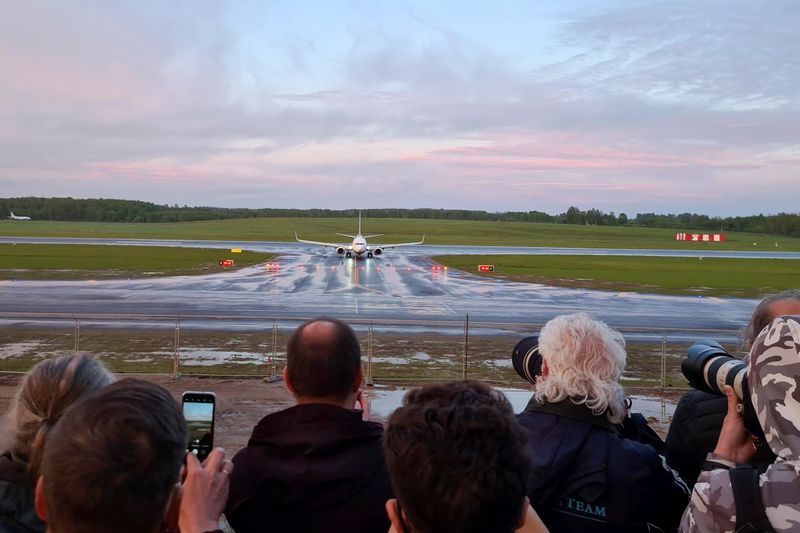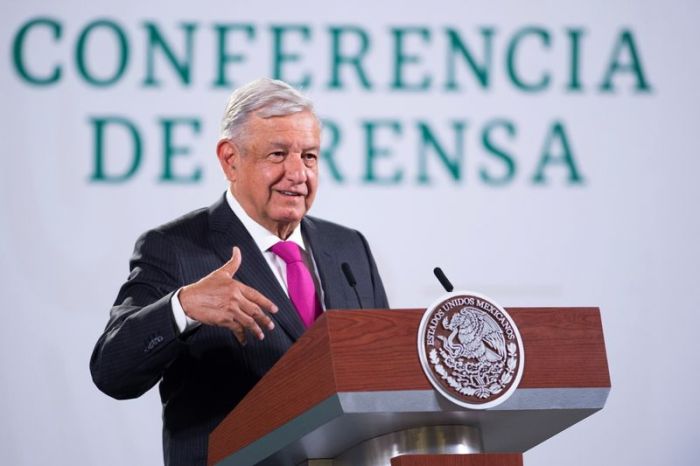PARIS (Reuters) -Global aviation faces its biggest political crisis in years after Belarus scrambled a fighter and flagged what turned out to be a false bomb alert to detain a dissident journalist, prompting U.S. and European outrage.
Some European airlines immediately began avoiding Belarus airspace, a key corridor between western Europe and Moscow and route for long-haul flights between western Europe and Asia.
“We, like all the European airlines are looking for guidance today from the European authorities and from NATO,” Ryanair Chief Executive Michael O’Leary told Ireland’s Newstalk radio.
Others, including Chinese and Turkish carriers, continued to fly over Belarus, which charges euro-denominated fees to use its airspace. Each flight brings Minsk revenue equivalent to some $500, adding up to millions each year, a Belarus official said.
The European Union Aviation Safety Agency (EASA) said it had notified its 31 member states about the incident and an airline source said the agency had recommended “caution” over Belarus.
Aviation experts said a decades-old system of cooperation now faces a crucial test under the glare of East-West tensions.
The U.N.’s International Civil Aviation Organization (ICAO) said the incident may have contravened a core aviation treaty: part of the international order created after World War Two.
“ICAO is strongly concerned by the apparent forced landing of a Ryanair flight and its passengers, which could be in contravention of the Chicago Convention,” it said on Sunday.
The Montreal agency called a meeting of its 36-member council, which has power to investigate any situation that may hinder the development of international aviation, for Thursday.
“It looks like a gross abuse of the (Chicago) Convention. It’s piracy,” Kevin Humphreys, a former Irish aviation regulator, said of the Belarus incident.
But experts cautioned that calls from some Western politicians for the outright closure of Belarus airspace would come up against tough obstacles.
Under global rules, neither ICAO nor any nation can close another’s airspace, but some, such as the United States, have the power to tell their own airlines not to fly there.
NO REGULATOR
Global airlines condemned any unlawful interference.
“A full investigation by competent international authorities is needed,” said the International Air Transport Association, which represents about 280 airlines. Ryanair is not a member.
It was not immediately clear how any probe would be organised.
Although highly regulated at a national level, and supported by harmonised rules to keep skies safe, aviation lacks a global policeman to avoid constant disputes over sovereignty.
While it has no regulatory power, ICAO sits at the centre of a system of safety and security standards that operates across political barriers but requires an often slow-moving consensus.
The rules are managed through the Montreal-based agency by its 193 members, including Belarus.
ICAO was thrown into discord over a wave of hijackings in the 1980s. Back then, the issue was whether to oblige countries to agree to let hijacked aircraft land on their soil.
Humphreys said it would be the first time in memory that the agency has had to ponder accusations that one of its own member countries had carried out what Ryanair’s O’Leary called “state-sponsored hijacking”.
Belarus insisted the alert was not a hoax and said its controllers had only issued “recommendations” to Ryanair pilots.
Russia accused the West of hypocrisy, citing the case of a Bolivian presidential plane forced to land in Austria in 2013 or a Belarus jetliner ordered to land in Ukraine three years later.
In 2013, Bolivia said President Evo Morales’ plane had been diverted over suspicions that former U.S. spy agency contractor Edward Snowden, wanted by Washington for divulging secret details of U.S. surveillance activities, was on board.
But aviation experts said the freedoms extended to civil airliners do not apply to presidential or state aircraft, which need special permission to enter another country’s airspace.
In the 2016 incident, Belarus national carrier Belavia said it had demanded compensation from Ukraine.
Lawyers say any probe or legal claim would also have to plough through a tangle of jurisdictions typical of liberalised air travel: a Polish-registered jet flown by an Irish group between EU nations Greece and Lithuania, over non-EU Belarus.
Under the 1944 Chicago Convention, each country has sovereignty over its own airspace, though the treaty prohibits any use of civil aviation that may endanger safety.
But the right to overfly other countries is contained in a side treaty called the International Air Services Transit Agreement, of which Belarus is not a member.
A separate 1971 treaty that includes Belarus outlaws the seizure of aircraft or knowingly communicating false information in a way that endangers aircraft safety.
(Reporting by Tim Hepher, Conor Humphries; Additional reporting by Pavel Polityuk, Laurence Frost, Susan Heavey, David Shepardson, Tracy Rucinski; Editing by Diane Craft, Alex Richardson and Mark Potter)


























